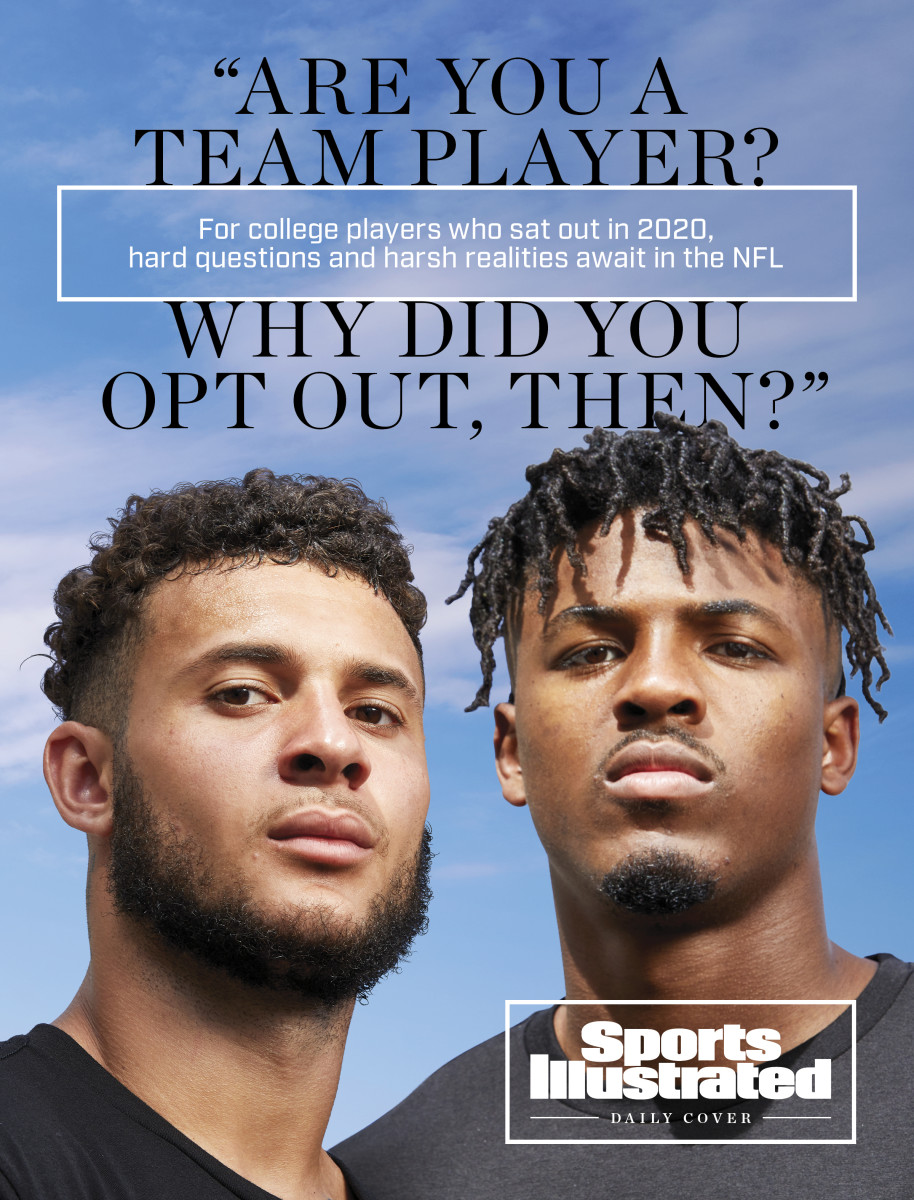Plankton
Well-Known Member
- Messages
- 12,488
- Reaction score
- 19,274
https://www.si.com/nfl/2021/04/07/daily-cover-nfl-draft-opt-out-covid
So far Gregory Rousseau has interviewed with more than 20 NFL teams in the lead-up to this month’s draft, and so far each video call has followed a similar line of inquiry. “Just different voices every time,” the former Miami Hurricanes defensive end says, “but it’s the same stuff.”
First the team officials on his Zoom screen start with small talk, lobbing softballs about his football background. “Like, ‘Walk me through your high school, walk me through getting recruited to Miami,’ ” says Rousseau, 21, a Coconut Creek, Fla., native whose 15.5 sacks as a sophomore in 2019 ranked second nationwide. Then the officials scooch closer to their cameras and someone segues with an ominous Soo . . . Rousseau knows what is next. “They always ask why I opted out,” he says. “It’s like clockwork.”
Plenty of draft hopefuls can relate. Where the upper crust of the class of 2021 is flush with potential star quarterbacks, the rest is defined by a larger yet equally intriguing prospect group—ranging from third-day fliers to first-round talents such as offensive tackles Penei Sewell (Oregon) and Rashawn Slater (Northwestern), receiver Ja’Marr Chase (LSU), cornerback Caleb Farley (Virginia Tech) and Rousseau—whose collective notoriety comes not from anything they did on the field last fall but because they didn’t play at all. Instead they elected to opt out of the college football season over health concerns amid the COVID-19 pandemic. “It feels like a brotherhood,” Farley says. “You know you have a lot in common with these guys.”

Jeffery A. Salter/Sports Illustrated
That includes the inevitable blitz of interview questions about their decisions, dialed up by NFL evaluators desperate for intel. “The conversation ain’t gonna go too long before it comes out,” says receiver Damonte Coxie, who left Memphis two games into the Tigers’ season. Often a quick explanation is enough to satisfy teams, as when Rousseau describes how he was influenced by the horror stories his mother, Anne, brought home from her 12-hour shifts as an ICU nurse in Fort Lauderdale last summer. “They all seem O.K. with it,” Rousseau says. “Probably want to hear it from my mouth, make sure I'm not switching up my story every 10 minutes.”
But some clubs press harder. Farley recalls one coach challenging him by snidely remarking, “How do we know you’re not just gonna opt out this season because of COVID, too?” Ambry Thomas, who skipped his senior year at Michigan in part due to his ulcerative colitis, which requires him to take immunosuppressants, recounts a testy exchange that began when brass from an NFC team asked whether the defensive back considered himself a team player. “I’m like, ‘Yeah, without a doubt,’ ” Thomas, 21, says. “They were like, ‘Why did you opt out, then?’ And then they just started ramming me.”
So far Gregory Rousseau has interviewed with more than 20 NFL teams in the lead-up to this month’s draft, and so far each video call has followed a similar line of inquiry. “Just different voices every time,” the former Miami Hurricanes defensive end says, “but it’s the same stuff.”
First the team officials on his Zoom screen start with small talk, lobbing softballs about his football background. “Like, ‘Walk me through your high school, walk me through getting recruited to Miami,’ ” says Rousseau, 21, a Coconut Creek, Fla., native whose 15.5 sacks as a sophomore in 2019 ranked second nationwide. Then the officials scooch closer to their cameras and someone segues with an ominous Soo . . . Rousseau knows what is next. “They always ask why I opted out,” he says. “It’s like clockwork.”
Plenty of draft hopefuls can relate. Where the upper crust of the class of 2021 is flush with potential star quarterbacks, the rest is defined by a larger yet equally intriguing prospect group—ranging from third-day fliers to first-round talents such as offensive tackles Penei Sewell (Oregon) and Rashawn Slater (Northwestern), receiver Ja’Marr Chase (LSU), cornerback Caleb Farley (Virginia Tech) and Rousseau—whose collective notoriety comes not from anything they did on the field last fall but because they didn’t play at all. Instead they elected to opt out of the college football season over health concerns amid the COVID-19 pandemic. “It feels like a brotherhood,” Farley says. “You know you have a lot in common with these guys.”

Jeffery A. Salter/Sports Illustrated
That includes the inevitable blitz of interview questions about their decisions, dialed up by NFL evaluators desperate for intel. “The conversation ain’t gonna go too long before it comes out,” says receiver Damonte Coxie, who left Memphis two games into the Tigers’ season. Often a quick explanation is enough to satisfy teams, as when Rousseau describes how he was influenced by the horror stories his mother, Anne, brought home from her 12-hour shifts as an ICU nurse in Fort Lauderdale last summer. “They all seem O.K. with it,” Rousseau says. “Probably want to hear it from my mouth, make sure I'm not switching up my story every 10 minutes.”
But some clubs press harder. Farley recalls one coach challenging him by snidely remarking, “How do we know you’re not just gonna opt out this season because of COVID, too?” Ambry Thomas, who skipped his senior year at Michigan in part due to his ulcerative colitis, which requires him to take immunosuppressants, recounts a testy exchange that began when brass from an NFC team asked whether the defensive back considered himself a team player. “I’m like, ‘Yeah, without a doubt,’ ” Thomas, 21, says. “They were like, ‘Why did you opt out, then?’ And then they just started ramming me.”


